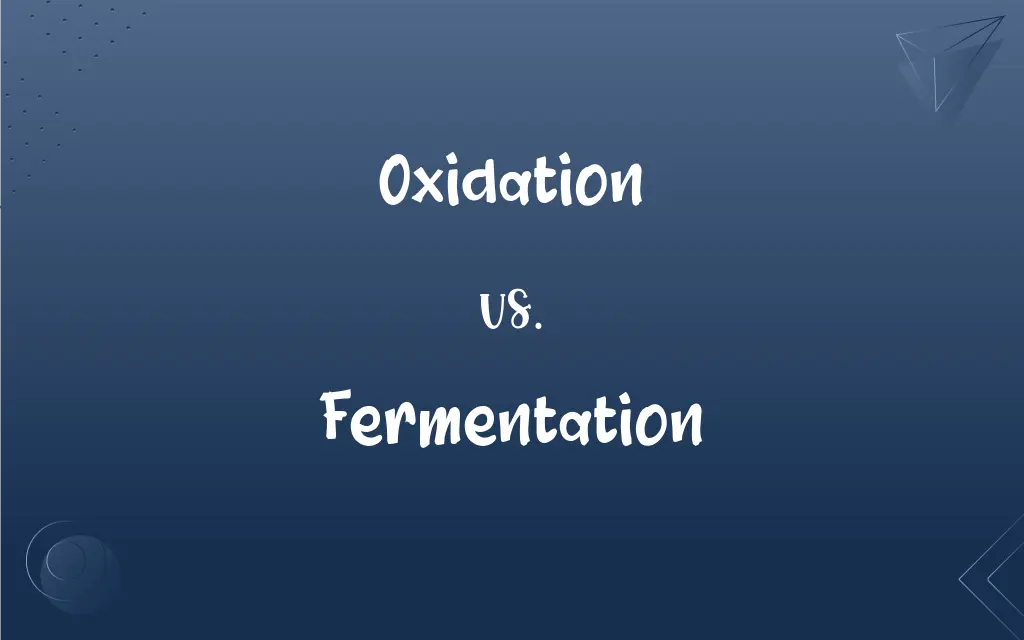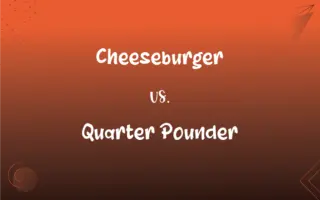Oxidation vs. Fermentation: What's the Difference?
Edited by Aimie Carlson || By Janet White || Published on December 31, 2023
Oxidation is the chemical process of losing electrons, often involving oxygen, while fermentation is a biological process converting sugars to acids, gases, or alcohol in the absence of oxygen.

Key Differences
Oxidation involves the loss of electrons from a molecule, often incorporating oxygen, fundamentally altering the chemical structure. In contrast, fermentation is a metabolic process where microorganisms like yeast and bacteria break down carbohydrates, like glucose, into other substances like alcohol or lactic acid, in an anaerobic environment.
Oxidation is a crucial part of various chemical and biological processes, including combustion and metabolism, where it often leads to energy release. Fermentation, on the other hand, is a form of anaerobic respiration used by organisms to generate energy without oxygen, producing organic products like ethanol in yeast or lactic acid in muscle cells.
In oxidation, the substance that loses electrons is said to be oxidized, often creating a more stable chemical state. Fermentation is a more specialized process, historically significant in food preservation and alcohol production, relying on the action of enzymes to convert sugars.
The role of oxidation is also pivotal in corrosion, like rusting of iron, and in aging processes. Fermentation differs as it is leveraged in culinary and industrial contexts, for example, in yogurt and beer production, through controlled microbial growth.
Oxidation can occur in both organic and inorganic substances, often producing heat and light, as in fire. Fermentation, distinctly biological, is utilized by living organisms for energy production under oxygen-limited conditions.
ADVERTISEMENT
Comparison Chart
Definition
Loss of electrons, often involving oxygen
Conversion of carbohydrates to alcohols, acids, gas
Requirement of Oxygen
Often requires oxygen
Occurs in absence of oxygen
Energy Production
Often releases energy
Produces energy in anaerobic conditions
Biological Role
Involves in metabolic processes
Key in anaerobic respiration
Industrial Use
In combustion, corrosion
In food and beverage production
ADVERTISEMENT
Oxidation and Fermentation Definitions
Oxidation
Reaction of a substance with oxygen.
The oxidation of glucose in our bodies provides energy.
Fermentation
Metabolic process in absence of oxygen.
Fermentation in muscles during exercise produces lactic acid.
Oxidation
Process causing an increase in oxidation state.
Oxidation of copper turns it green over time.
Fermentation
Anaerobic conversion of sugar to alcohol or acid.
Yeast causes fermentation in dough, making it rise.
Oxidation
Removal of hydrogen from a compound.
The oxidation of ethanol produces acetic acid.
Fermentation
Chemical breakdown of substances by bacteria, yeast.
Sauerkraut is made through the fermentation of cabbage.
Oxidation
Loss of electrons from a substance.
Iron oxidizes to form rust.
Fermentation
Biological process producing ethanol or lactic acid.
Fermentation in grapes is essential for wine production.
Oxidation
Chemical reaction producing free radicals.
Sunlight can cause oxidation in skin cells.
Fermentation
Process of energy production in cells without oxygen.
Kefir is a product of milk fermentation.
Oxidation
The combination of a substance with oxygen.
Fermentation
Any of a group of chemical reactions induced by microorganisms or enzymes that split complex organic compounds into relatively simple substances, especially the anaerobic conversion of sugar to carbon dioxide and alcohol by yeast.
Oxidation
A reaction in which the atoms of an element lose electrons and the valence of the element is correspondingly increased.
Oxidation
The combination of a substance with oxygen.
Oxidation
(chemistry) A reaction in which the atoms of an element lose electrons and the oxidation state of the element increases.
Oxidation
The act or process of oxidizing, or the state or result of being oxidized.
Oxidation
The process of oxidizing; the addition of oxygen to a compound with a loss of electrons; always occurs accompanied by reduction
FAQs
What is oxidation?
A chemical reaction where a substance loses electrons, often involving oxygen.
What is fermentation?
A biological process converting sugars into alcohols, acids, or gases without oxygen.
How do oxidation and fermentation differ in energy production?
Oxidation often releases energy, while fermentation enables energy production in anaerobic conditions.
Can oxidation occur without oxygen?
Yes, oxidation can occur without oxygen when electrons are lost to other substances.
What role does fermentation play in baking?
It causes dough to rise by producing gas.
What are common examples of oxidation?
Rusting of iron and burning of fuel are common examples.
Is fermentation only caused by yeast?
No, fermentation can also be caused by bacteria and other microorganisms.
Is oxidation a natural process?
Yes, it occurs naturally in processes like aging and respiration.
What's an example of industrial use of oxidation?
Industrial combustion processes often involve oxidation.
Can fermentation occur in the human body?
Yes, muscle cells undergo fermentation when oxygen is scarce.
How is fermentation controlled in food production?
By regulating microorganisms and environmental conditions.
Does oxidation always involve a change in color?
Not always, but it often leads to visible changes like rusting.
Can oxidation be reversed?
Some oxidation reactions can be reversed through reduction.
Are antioxidants related to oxidation?
Yes, they prevent or slow down oxidation in cells.
What products result from fermentation?
Products like alcohol, vinegar, and yogurt result from fermentation.
How does temperature affect fermentation?
Temperature impacts the rate and efficiency of fermentation.
Is oxidation harmful to the human body?
Excessive oxidation can damage cells, leading to aging and diseases.
Are there environmental impacts of oxidation?
Yes, oxidation processes like rusting and burning fossil fuels have environmental impacts.
What is the by-product of fermentation in bread?
Carbon dioxide is a by-product, causing the dough to rise.
How does pH affect fermentation?
The acidity level can influence the rate and type of fermentation.
About Author
Written by
Janet WhiteJanet White has been an esteemed writer and blogger for Difference Wiki. Holding a Master's degree in Science and Medical Journalism from the prestigious Boston University, she has consistently demonstrated her expertise and passion for her field. When she's not immersed in her work, Janet relishes her time exercising, delving into a good book, and cherishing moments with friends and family.
Edited by
Aimie CarlsonAimie Carlson, holding a master's degree in English literature, is a fervent English language enthusiast. She lends her writing talents to Difference Wiki, a prominent website that specializes in comparisons, offering readers insightful analyses that both captivate and inform.







































































